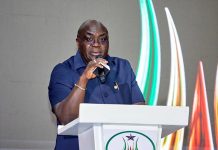
A section of the student population of the Kwame Nkrumah University of Science and Technology (KNUST) who had to defer their programmes of study for non-payment of fees have received a reprieve, as they have a four-week moratorium to settle their fees.
The Education Minister, Dr. Yaw Osei Adutwum, has directed that the Students Loan Trust Fund (SLTF) in consultation with the University Council and management confer with the affected students to see how best they could access financial support.
The directive, made last Friday in the presence of the Chief Executive Officer of the SLTF, Nana Kwaku Agyei Yeboah, is a function of a meeting of stakeholders, including the Student Representative Council (SRC), which deliberated on an earlier position of the University that
Students who owed more than 70 per cent of their school fees were to automatically defer their courses.
As at Wednesday, April 20, over 6,000 students risked deferring their programmes, but management of KNUST has rescinded its decision to enforce the Student Credit and Debt Management Policy, following the Education Minister’s intervention, which comes from the approval of the “No guarantor policy” by President Nana Akufo-Addo.
The affected students now have up to May 15, 2022 to settle their fees by taking advantage of the presence of the SLTF on campus to access the loan facility, now that Parliament has passed the bill to enforce the no guarantor system.
The Education Minister commended the KNUST SRC for the swift intervention to bring up the plight of the students to the attention of management for necessary action. He also commended the University authorities for softening their stance on an earlier decision in order to afford all students the opportunity to have access to education, in line with the vision of the President of the Republic of Ghana.
Meanwhile, the KNUST has reversed the deferral of about 3,550 out of the 6000 students who have cleared their debts, following the opportunity offered them to pay their fees after the expiration of the April 7 deadline. The University Relations Officer, Dr. Daniel Norris Bekoe, disclosed that about 600 Ghanaian students and 750 international students have since made personal payments, while the Dean of Students Scholarship Scheme has catered for some 2,200 students.
He appealed to the students to meet their obligations for the University to accrue enough Internally Generated Funds to complement the government’s support to run the University.
Meanwhile, SLTF CEO, Nana Yeboah said the Minister of Education is working to find ways for students who were not benefitting from the SLTF to be brought on board.
The CEO revealed that 683 beneficiaries of the fund were among the 6,000 continuing students who deferred their programmes of study.
He explained that SLTF had paid GH¢831,525 against the current semester and that his outfit was processing the applications of 1,457others, who would soon be paid.
Nana Yeboah attributed the delay in the payment of loans to the 1,457applicants to the time Parliament took to pass the bill to convert from the guarantor system to the no guarantor system.
In another development, Mr. Ernest Akosah, Deputy Public Relations Officer of the Ministry of Education has explained the procedures and processes involved in the school placement system to avoid confusion in the sector.
According to him, the entire process with the school’s placement system has been thoroughly conducted, yet some parents and guardians of students who participated in the BECE have registered their displeasure about the placement system.
He was of the view that some of the parents believe the electronic system has been unfair to their wards since they were not posted to their schools of choice, despite having impressive grades.
Others have also expressed the opinion that they would prefer the old system of school placement selection to continue along with the electronic process.
Speaking in an interview with the media, he explained that there are three significant procedures involved in the school placement for students and that, each of the processes are used to complete the students’ placement to their preferred choices.
According to him, the last choice of school should be within one’s locality so that in the event that none of the chosen schools offer admission, the student would at least be posted to a school closer to him.
The PRO explained that there is an automatic placement for some schools, the manual placement and the self-placement modules.
He reiterated that some schools require a specific number of students, whilst others are apportioned 5% of students and added that the self-placements module is the last resort.
He stated that, there are automatic placements where some schools declare the number of students they want before the course is considered.
Mr. Akosah disclosed that at the end of the day, if the number of students who chose to study Science in a particular school is about 250 and all had grade 6, they consider the aggregate, while the totality of one’s marks for the various subjects is added together.
He stressed that the ministry should look at the core subjects, including Maths, Science, English, and Social Studies before any other two electives, hence most of the students could get an aggregate of 7 but would not be posted to their preferred choices because they may choose a course like Science.
He said others could make lower grades and still be placed because of the course they chose.
From Sebastian R. Freiku & Ernest Best Anane, Kumasi









